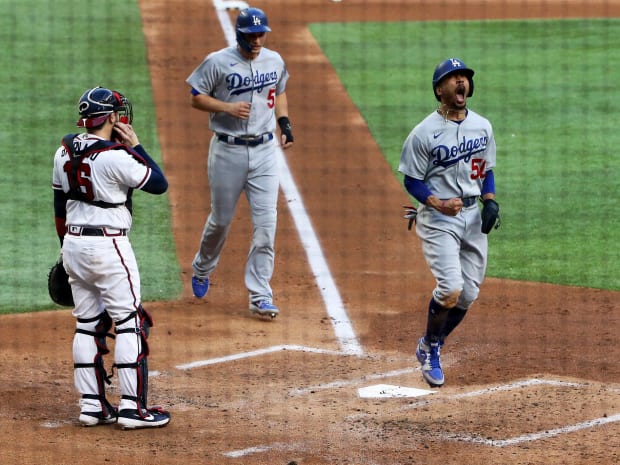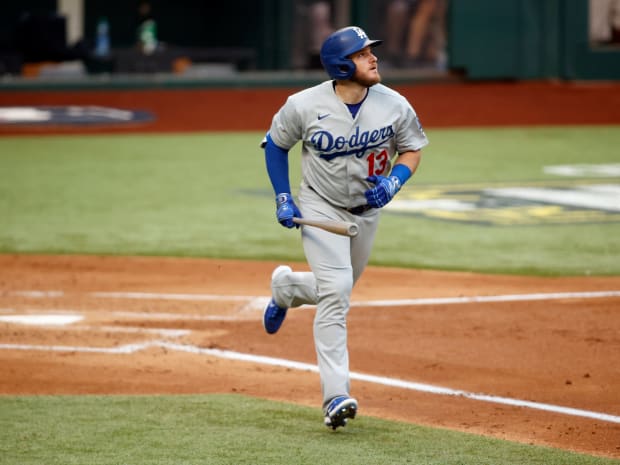The Dodgers scored 11 runs in the first inning against the Braves to win their first game of the NLCS.
ARLINGTON — If it is possible to be leading a series down two games to one, the Los Angeles Dodgers may have pulled off that grammatical oddity. They flipped the National League Championship Series with a record-breaking 15–3 trouncing of the Atlanta Braves in Game 3 Wednesday night.
Like dangling participles and misplaced modifiers, Atlanta pitchers deserved the rebukes the Dodgers provided. After their first 12 swings, 10 of which put the ball in play, the Dodgers led 11-0 in the
biggest inning in postseason history.The Dodgers made the Braves throw 234 pitches, smashing the record for a nine-inning playoff game since detailed pitch records are available (since 1988). The old record was 215.
“We took quality at-bats all night,” said Los Angeles shortstop Corey Seager, who with his first three swings doubled home a run, singled home a run and homered. “Even when we got up, people were grinding out pitches. We made them throw a lot of pitches. That’s what you want in a long series like this. You want to get to guys as much as possible, and we did that tonight.”

An offense that looked stagnant heading into the seventh inning of Game 2 ripped off 22 runs in its next six innings. Try coming at the Dodgers with passive and/or rusty pitching and you get your doors blown off by this powerful lineup.
It wasn’t just the 15–3 score or the awakening of the game’s highest-scoring offense that flipped this series. It’s also that the series is playing out according to script. The middle games of this series always figured to be a minefield for the Braves. They just don’t have the starting pitching depth to match up with Los Angeles in Games 3, 4 and 5.
The Braves are 19-4 when they give the ball to Max Fried or Ian Anderson and 23-22 when they give it to anybody else. Fried and Anderson are 12-2 with a 1.93 EA. All the other starters are 5-15 with a 7.41 ERA.
The way for Atlanta to win this series is to either win all of the games started by Fried and Anderson or just steal one along the way. This wasn’t it by any means. Game 3 starter Kyle Wright proved there is nothing more determinative in pitching than count leverage. Wright gave up seven runs with only 28 pitches—only one of which was thrown when he was ahead in the count. He gave up hits and walks on counts of 0-0, 0-0, 3-1, 3-1, 2-1, 0-0, and 3-2.
What the Braves are trying to do is reminiscent of how the Nationals won the World Series last year. They were 4-0 against Houston when Stephen Strasburg or Max Scherzer started and 0-3 with anyone else. For the postseason, Washington was 10-0 in Strasburg/Scherzer starts and 2-5 in the others.
As bad as Game 3 looked, this is what the next two games look like for Atlanta:
Game 4: Rookie Bryse Wilson, who has thrown less than 16 innings this year, against three-time Cy Young Award winner Clayton Kershaw.
Game 5: A bullpen game—I would use Tyler Matzek as the opener—against Dustin May and his 100-mph sinker.
“Quite honestly, we’re in better shape than if we grinded out a 7–5 loss,” Braves manager Brian Snitker said.

By that Snitker meant that he gave catcher Travis d’Arnaud, first baseman Freddie Freeman and outfielder Ronald Acuña Jr. half a night off with the game so out of hand, and none of his top relievers were needed.
But there is a down side, too. So poor was Wright that he may have eliminated himself as an option for Game 5, if not the rest of the series, as perhaps Josh Tomlin did with his poor outing in Game 2. And all those hits by Los Angeles boosted the swagger and batter’s box confidence of virtually the entire Dodgers lineup. In particular, Cody Bellinger, whose bat looked strangely slow until the ninth inning of Game 2, found the whip in his swing and looks primed to be a force again. He took pitches on balance in Game 3 (two walks) and squared up strikes for a home run and single. He was on base four times, scored two runs, drove in two runs and stole a home run with a leaping catch at the center-field wall. He had only one complaint.
“I’m tired, man,” Bellinger said on the field after the four-hour, 15-minute slog. “My legs! That outfield is huge.”
It’s long, hard work wearing out the underbelly of pitching staffs. But you should remember what happened to the two teams that held the old record for most pitches seen in a nine-inning playoff game. After the 2001 Mariners saw 215 pitches in a 14–3 ALCS win over the Yankees, they never won another game (losing two games). After the 2004 Yankees saw 215 pitches in a 19–8 ALCS beatdown of Boston, they never won another game (losing four times).
The difference? The 2001 Yankees gave the ball to Roger Clemens the next day. The 2004 Red Sox gave the ball to Derek Lowe. For their resuscitation, the Braves are giving the ball to a 22-year-old rookie who hasn’t pitched in 17 days. Suddenly, but not surprisingly, this series looks like a long one.
The Dodgers scored 11 runs in the first inning against the Braves to win their first game of the NLCS.
ARLINGTON — If it is possible to be leading a series down two games to one, the Los Angeles Dodgers may have pulled off that grammatical oddity. They flipped the National League Championship Series with a record-breaking 15–3 trouncing of the Atlanta Braves in Game 3 Wednesday night.
Like dangling participles and misplaced modifiers, Atlanta pitchers deserved the rebukes the Dodgers provided. After their first 12 swings, 10 of which put the ball in play, the Dodgers led 11-0 in the biggest inning in postseason history.
The Dodgers made the Braves throw 234 pitches, smashing the record for a nine-inning playoff game since detailed pitch records are available (since 1988). The old record was 215.
“We took quality at-bats all night,” said Los Angeles shortstop Corey Seager, who with his first three swings doubled home a run, singled home a run and homered. “Even when we got up, people were grinding out pitches. We made them throw a lot of pitches. That’s what you want in a long series like this. You want to get to guys as much as possible, and we did that tonight.”

An offense that looked stagnant heading into the seventh inning of Game 2 ripped off 22 runs in its next six innings. Try coming at the Dodgers with passive and/or rusty pitching and you get your doors blown off by this powerful lineup.
It wasn’t just the 15–3 score or the awakening of the game’s highest-scoring offense that flipped this series. It’s also that the series is playing out according to script. The middle games of this series always figured to be a minefield for the Braves. They just don’t have the starting pitching depth to match up with Los Angeles in Games 3, 4 and 5.
The Braves are 19-4 when they give the ball to Max Fried or Ian Anderson and 23-22 when they give it to anybody else. Fried and Anderson are 12-2 with a 1.93 EA. All the other starters are 5-15 with a 7.41 ERA.
The way for Atlanta to win this series is to either win all of the games started by Fried and Anderson or just steal one along the way. This wasn’t it by any means. Game 3 starter Kyle Wright proved there is nothing more determinative in pitching than count leverage. Wright gave up seven runs with only 28 pitches—only one of which was thrown when he was ahead in the count. He gave up hits and walks on counts of 0-0, 0-0, 3-1, 3-1, 2-1, 0-0, and 3-2.
What the Braves are trying to do is reminiscent of how the Nationals won the World Series last year. They were 4-0 against Houston when Stephen Strasburg or Max Scherzer started and 0-3 with anyone else. For the postseason, Washington was 10-0 in Strasburg/Scherzer starts and 2-5 in the others.
As bad as Game 3 looked, this is what the next two games look like for Atlanta:
Game 4: Rookie Bryse Wilson, who has thrown less than 16 innings this year, against three-time Cy Young Award winner Clayton Kershaw.
Game 5: A bullpen game—I would use Tyler Matzek as the opener—against Dustin May and his 100-mph sinker.
“Quite honestly, we’re in better shape than if we grinded out a 7–5 loss,” Braves manager Brian Snitker said.

By that Snitker meant that he gave catcher Travis d’Arnaud, first baseman Freddie Freeman and outfielder Ronald Acuña Jr. half a night off with the game so out of hand, and none of his top relievers were needed.
But there is a down side, too. So poor was Wright that he may have eliminated himself as an option for Game 5, if not the rest of the series, as perhaps Josh Tomlin did with his poor outing in Game 2. And all those hits by Los Angeles boosted the swagger and batter’s box confidence of virtually the entire Dodgers lineup. In particular, Cody Bellinger, whose bat looked strangely slow until the ninth inning of Game 2, found the whip in his swing and looks primed to be a force again. He took pitches on balance in Game 3 (two walks) and squared up strikes for a home run and single. He was on base four times, scored two runs, drove in two runs and stole a home run with a leaping catch at the center-field wall. He had only one complaint.
“I’m tired, man,” Bellinger said on the field after the four-hour, 15-minute slog. “My legs! That outfield is huge.”
It’s long, hard work wearing out the underbelly of pitching staffs. But you should remember what happened to the two teams that held the old record for most pitches seen in a nine-inning playoff game. After the 2001 Mariners saw 215 pitches in a 14–3 ALCS win over the Yankees, they never won another game (losing two games). After the 2004 Yankees saw 215 pitches in a 19–8 ALCS beatdown of Boston, they never won another game (losing four times).
The difference? The 2001 Yankees gave the ball to Roger Clemens the next day. The 2004 Red Sox gave the ball to Derek Lowe. For their resuscitation, the Braves are giving the ball to a 22-year-old rookie who hasn’t pitched in 17 days. Suddenly, but not surprisingly, this series looks like a long one.


0 Comments